
Syria
Syria, here, is flat and dry, with some agriculture. The outskirts of Damascus are ugly, with buildings of cinderblock and dilapidated concrete. But the city exudes a vitality, and there is no sign of poverty. Cell phones are ubiquitous.In the evening we go to an enormous outdoor restaurant near the airport. This place is easily the size of a football field, and is interlaced with waterways, bridges, waterfalls, windmills, grottoes, and lagoons. We sit at a large table in a faux boat next to a waterwheel, and have a magnificent meal. We have pita bread so fresh that it steams when torn open, tabouleh of mostly parsley, salads, olives and pickles, hummus, yogurt, kiffir with salt and garlic, little pizzas, cheese pastries, kubbeh (also called "Syrian grenades" -- pastry shells filled with ground meats and pine-nuts), raw ground lamb, kabobs of chicken, lamb, and spiced ground lamb, all followed by fruits and melons. There are several similar restaurants in the area, one is Italian-themed, another is Ancient Rome.
18-sep-03, morning
This morning we visit Patriarch Ignatius IV (Hazeem) of Antioch, the Patriarch of the Syrian Orthodox Church. We sit at one end of a large and ornate reception hall. The Patriarch speaks excellent English, he has been to America "many times", but he speaks very softly. He proves to be a very subtle thinker. As usual, coffee is served.
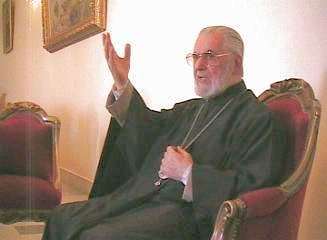
Christians here know how to co-exist happily with Muslims. The colonial period introduced some divisiveness. Syria is different from Egypt; here we're free to co-exist. Persian, Greek, and Islamic cultures all intersect here -- "we are a place of meetings". It is multicultural: "we don't need to be trained to conduct dialogue". Jews didn't leave because of persecution. [Although I have heard differently elsewhere. I haven't found any information on this topic that I fully trust.] Christians are free to observe the Sabbath, and shops usually have signs "closed on Sunday" or "closed on Friday". Christmas is a national holiday. Churches get their gas and electricity for free, just like the mosques. "We are being together; I don't even call it a dialogue."
Everyone in Syria thinks that America is a Christian country. Syria is not secular in the same way we are; every citizen is identified as belonging to a religious community.
The Patriarch recounts the time he met the U.S. Ambassador walking alone near the church. The Patriarch asked "why are you walking alone?" The ambassador answered "because I can't do this at home." This story illustrates the safety here; there is virtually no violent crime. Women can walk anywhere in Damascus any time of night and be safe. The police are not even armed.
The Patriarch does say that "things could be better", particularly citing the single-party system. But he is optimistic, and states that "change in the area must come from Syria and Lebanon". (He states that Syrians view Lebanon as a part of their country. We'll hear this many times in Syria.) "We are happy. Not very happy -- we can wish for better -- but we are happy."
He talks more about relations between the Christian denominations. He says that the churches have a "gentlemen's agreement" not to call for unity -- that they prefer the diversity. However, they are currently having problems with Protestant evangelicals who seek to re-introduce divisiveness.
The Patriarch discusses the Palestine issue. He regrets that Christianity seems to have no place in Israel/Palestine. Christians and Muslims here all pay a price for the Palestine issue, but Christians have no voice in resolving it. Christians are oppressed in Israel. (He says that there is a limit of 5,000 on the Christian population of Jerusalem. I find this hard to believe but won't dismiss it.) He states that Palestine is a political issue, not a religious one. If it were a religious issue, Christianity would not be ignored, as Jerusalem is as sacred to Christians as it is to Jews and Muslims.
"My religion", he says, "is very concrete." There is a very strong historical sense here, a sense of being bound to place. He also talks of "the oppression of hope." This part of the world is very religious; God is mentioned in almost every phrase here, by both Christians and Muslims: "God willing", "thank god", etc.
18-sep-03, 11:50 am
We visit the Syrian parliament building and are greeted by several members of parliament, two Muslim and one Roman Catholic. One of them is an old school chum of Bashar's. We go to a meeting room and are served the customary tea.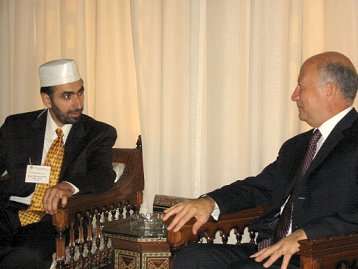 Then,
Issam Al Jamal, Vice President of the Parliament, arrives and
everyone stands to shake hands with him.
He has been assigned the task of forming a new government, in which
he will be
President of the Parliament.
Then,
Issam Al Jamal, Vice President of the Parliament, arrives and
everyone stands to shake hands with him.
He has been assigned the task of forming a new government, in which
he will be
President of the Parliament.
We go right to the Palestine issue. Syrians regard Israel as an occupying state. Al Jamal emphasizes the Madrid conference, where "America guaranteed peace". He believes that Israel doesn't intend peace, particularly citing home demolition and targeted assassinations. (These two actions were cited over and over again during our trip; they seem to particularly infuriate Arab peoples.) Syria, he says, has never been the aggressor, but Israel was. Like everyone else that we talked to, he accepts the existence of Israel as a given. Pressed for details on an equitable resolution, he supports pre-'67 borders (the "Green Line") and right of return. He also brings up the [untenable] idea of a Jewish-Arab state and criticizes Israel's refusal.
He would like to see the entire Middle East free of WMD, including Israel. It is unfair, he says, for the U.S. to attempt suppression of WMD in only the Arab states.
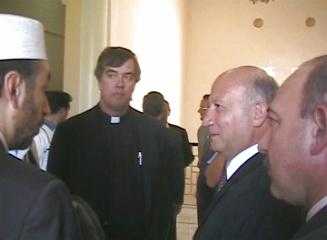 Al Jamal notes the religious pluralism of Syria, pointing to the
diversity of the parliamentarians sitting next to him.
Christians and Muslims often go together to mosques and churches on
holy days, and some Christians fast at Ramadan.
Al Jamal notes the religious pluralism of Syria, pointing to the
diversity of the parliamentarians sitting next to him.
Christians and Muslims often go together to mosques and churches on
holy days, and some Christians fast at Ramadan.
The Syrian Parliament has 250 members, and there are 6 in the office of the President. Al Jamal has been assigned the task of forming a new government. This reorganization is taking place this very day, so many of the figures that we talk to will have different titles tomorrow.
Syria has no organized effort to communicate with America. We tell him about Saudi Arabia's highly visible public relations efforts in the U.S.
18-sep-03, 1:10 pm
On the way to meet with Bouthaina Shaaban, Director of Foreign Media, Syrian Foreign Ministry. Bashar tells us that she was Hafez Assad's personal interpreter. Also, there is a rumor that she will be the Foreign Minister after the government reorganization that is taking place this very day. She is also author of "Both Right and Left Handed", a book about Arab women.
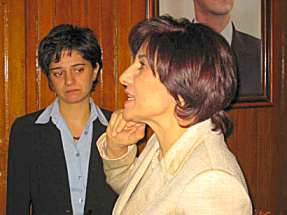 Ms. Shaaban is very articulate and speaks excellent English.
She went to college in the U.S. (Cornell or Columbia, I forget which).
She has been to America twice this year (2003).
Her assistant is also U.S.-educated.
This meeting is one of our best; she is frank, forthright, and we have
a real back-and-forth discussion for a change.
(By the end of the day she will be elevated to a ministry,
but she'll be Minister of Syrians Living Abroad rather than the
Foreign Minister. However, it's a high-visibility position; recent Googling
turns up a lot of her recent quotes in the international press.)
We are served tea.
Ms. Shaaban is very articulate and speaks excellent English.
She went to college in the U.S. (Cornell or Columbia, I forget which).
She has been to America twice this year (2003).
Her assistant is also U.S.-educated.
This meeting is one of our best; she is frank, forthright, and we have
a real back-and-forth discussion for a change.
(By the end of the day she will be elevated to a ministry,
but she'll be Minister of Syrians Living Abroad rather than the
Foreign Minister. However, it's a high-visibility position; recent Googling
turns up a lot of her recent quotes in the international press.)
We are served tea.
She cites some myths about the U.S. that are widely believed here: that the U.S. wants everyone to be a copy of themselves, that the U.S. media is controlled by the Israelis, that Americans believe that Syrian women are oppressed.
Of course we discussed Palestine. At the 2002 Beirut conference, Arabs agreed that a just resolution would guarantee Israel's security in return for withdrawal to the Green Line. Sharon refused this. The Madrid proposal is the closest we've come to a settlement, but Barak wouldn't close the deal. Arabs were particularly upset when Bush called Sharon "a man of peace." She also cites the targeted assassinations; a friend of hers, who she believes was never involved in terrorism, was one of the targets. She points out that Western legal systems forbid prosecution based on suspicion of intent rather than on action, and that these assassinations violate that principle. She does say that Syrians believe that Arafat is corrupt and is prolonging the violence for his own ends.
Syria feels left out of the peace process. They feel that Syria is a key player and cannot be ignored, and that America has been acting unilaterally and in ignorance. The U.S. can no longer claim to be a fair arbiter. A new administration might be able to reclaim this image. Arabs, she says, have generally viewed America favorably. America, after all, has never been a colonial power here. She professes a particular admiration for Jimmy Carter and for Anwar Sadat.
She discusses the problems of women, which sound very familiar to us: particularly the glass ceiling. She does note that Syria subsidizes daycare and that any business with more than 50 employees is required to provide it. Women in Syria feel safe -- the crime rate is very low. But there should be more women in decision-making positions. The parliament is 10% female. She feels that a major factor that holds women back is their own lack of self-confidence.
We touch on Iraq. "You could have had the oil and our love." The Iraqi government actually opposed the lifting of sanctions by Arab states. Lifting the sanctions would have given the Iraqi people more power to overthrow Saddam. She feels sorrow for the Iraqis, a very educated and westernized people. She recounts the saying (that I've heard elsewhere) that "Cairo writes, Beirut publishes, and Baghdad reads".
Shaaban, like many others, cites the title "Clash of Civilizations", hoping instead for a "Dialogue of Civilizations". The Arab world has become much more polarized after 9/11; many of Shaaban's friends deride her moderation, calling it naive. To mend it's image, all that America needs to do is to treat the Arab world with respect and fairness.
I ask a long and deliberately leading question: The Arab nations are so focused on the Palestinian issue that they aren't addressing their own internal problems. Some leaders even seem to be using the Palestinian issue to divert attention from their own shortcomings. What would be the prime problems, the "next steps", in the Arab world if the Palestinian issue were "magically" resolved? Ms. Shaaban nods in agreement with the question, then thinks for a moment, and says "unemployment and the economy, followed by democratic reform".
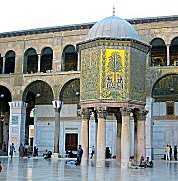 After a lunch in the Souk, the old covered market, we go to the Ummayad
Mosque, built in 715.
The women in our group are loaned gown-like garments with hoods to
cover their heads.
Inside the complex is the tomb of Saladin, who expelled the crusaders
from Jerusalem.
The mosque itself is very beautiful, with striking mosaics covering the exterior.
Inside is a shrine to John the Baptist, which is said to contain his head.
John is an important Islamic prophet, so the shrine is surrounded by
both Christians and Muslims.
Blind Koran-reciters sit nearby, reciting in return for offerings.
Children play, and people chat; the mosque is not a solemn place.
People even sleep on the rugs, although occasionally
attendants with sticks go around to prod them awake.
After a lunch in the Souk, the old covered market, we go to the Ummayad
Mosque, built in 715.
The women in our group are loaned gown-like garments with hoods to
cover their heads.
Inside the complex is the tomb of Saladin, who expelled the crusaders
from Jerusalem.
The mosque itself is very beautiful, with striking mosaics covering the exterior.
Inside is a shrine to John the Baptist, which is said to contain his head.
John is an important Islamic prophet, so the shrine is surrounded by
both Christians and Muslims.
Blind Koran-reciters sit nearby, reciting in return for offerings.
Children play, and people chat; the mosque is not a solemn place.
People even sleep on the rugs, although occasionally
attendants with sticks go around to prod them awake.
19-sep-03
I was sick all day, so this account is second-hand.Today the group visits the mosque of Sheik Ahmad Kuftaro, the Grand Mufti of Syria. The Sheik is very interested in inter-faith dialogue, and has an excellent website at kuftaro.org. (We later discover that the Sheik and his order are Sufi. Sufism is the mystical wing of Islam, and has a strong anti-authoritarian tradition.)
Our group first meets with the Sheik's son and spokesman, Salah Kuftaro. The Sheik is almost 90, and is in declining health. Today is Friday, the Muslim Sabbath. Every Friday the Sheik and his guests give talks to his followers. Rev. David Parks-Ramage of our group will give a talk today.
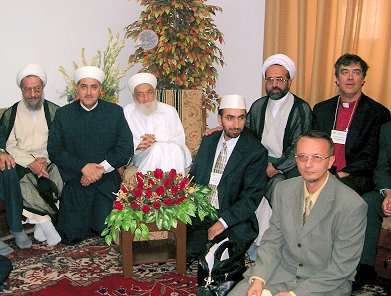 The group goes to the mosque itself, a large but somewhat ugly modern
building. The women go to the first balcony, the men sit near
the podium on the ground floor.
We are told that there are 25,000 here, and that another
100,000 will listen to the live webcast.
After a talk by the Sheik, David gives a short, excellent talk.
Next, a Shiite from Iran speaks. He appears to be a hardliner.
However, when the event is over he approaches David and invites him
to Iran!
The group goes to the mosque itself, a large but somewhat ugly modern
building. The women go to the first balcony, the men sit near
the podium on the ground floor.
We are told that there are 25,000 here, and that another
100,000 will listen to the live webcast.
After a talk by the Sheik, David gives a short, excellent talk.
Next, a Shiite from Iran speaks. He appears to be a hardliner.
However, when the event is over he approaches David and invites him
to Iran!
Kuftaro is widely viewed as a moderate, but I should note that he
did issue a fatwa approving of any attacks on Americans in Iraq.
His son has publicly disavowed this fatwa, calling it an error, but
as of December 2003 the fatwa was still posted on the website.
(See the
New York Times article for more.)
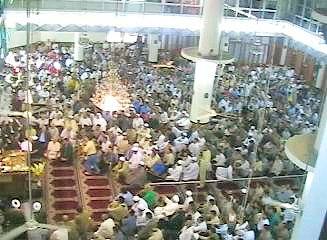
 That day Bashar's family hosts the group for a huge mid-day feast.
His family is very large, very friendly, and has many excellent cooks.
That day Bashar's family hosts the group for a huge mid-day feast.
His family is very large, very friendly, and has many excellent cooks.
I rejoin the group and we drive up Mt. Qassioun, which overlooks Damascus, to enjoy the view. It's the Sabbath, so a lot of people are here. Some sit on rugs and drink tea from samovars, others stroll and talk. We hear the muezzin's call, and many people pray on their small rugs, but many others ignore the call.
We return to the old town and walk down Straight Street towards our restaurant. We pause at an old Khan that is being restored: it will become the Damascus Museum of Natural History. The khan, built in 1749, was a caravansary, or a hotel of sorts. There is an open central courtyard, where the pack animals stayed, surrounded by sheltered balconies where the people slept.
Our restaurant is old, with archways dating back to the 8th century. There are faded prints of Queen Victoria's Jubilee and of long-dead race-horses. The Sheik's son, Salah Kuftaro, dines with us. Whirling Dervishes perform; a great mystic practice reduced to dinner entertainment...
20-sep-03
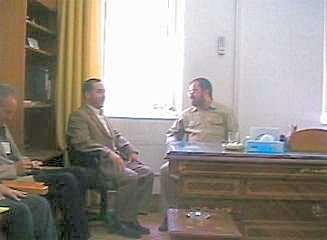 We visit the University of Damascus, which looks much like any
American university.
We go to an older building and enter a meeting room in the
Department of Sharia. The weather is hot, we are in
suits and ties, and there is no air-conditioning.
We are scheduled to meet with the Dean, but he is detained elsewhere.
We instead talk, over tea, with his assistant.
Bashar is not with us, so Aziz translates.
We visit the University of Damascus, which looks much like any
American university.
We go to an older building and enter a meeting room in the
Department of Sharia. The weather is hot, we are in
suits and ties, and there is no air-conditioning.
We are scheduled to meet with the Dean, but he is detained elsewhere.
We instead talk, over tea, with his assistant.
Bashar is not with us, so Aziz translates.
Islam decrees different courts for Muslims, Christians, and Jews. (Upstairs from us, Jewish and Christian Law are taught.) There is a separate discipline for "personal Islamic law", covering subjects like birth, death, and marriages. The role of the Imam is narrow; the government "handles everything".
We ask about pastoral counseling and mental illness. These are unfamiliar topics here; there is not much understanding even of disorders like schizophrenia.
We also ask about the role of doubt. The school does have a special course on "suspicions", where certain dangerous questions are entertained. For example, what if Mohammed, rather than God, wrote the Koran? However, the goal of the course is to allay all doubts; an Imam cannot have suspicions.
Philosophy and Theology are taught only after the 4-year undergraduate Sharia course.
The School of Sharia has more women students than men, and there are women on the faculty. There is no movement to allow women to be Imams. We are told that women can't pray or fast during menstruation, which would make them inappropriate Imams.
20-sep-03, early afternoon
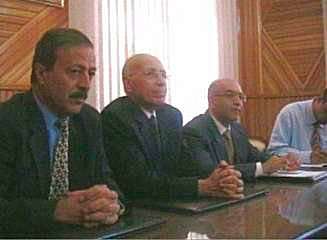 We walk to another building on the campus of Damascus University to meet
Dr. Hani Murtada, Minister of Higher Education, and
Dr. Mohammed Issam al-Awa, President of Damascus University.
In yesterday's governmental reorganization, Dr. Murtada
was elevated from President of Damascus University to the Ministry, and
Dr. al-Awa moved from the Vice-Presidency to the Presidency.
The Vice-President of the University, a Roman Catholic, is also with us.
All of them speak excellent English.
We walk to another building on the campus of Damascus University to meet
Dr. Hani Murtada, Minister of Higher Education, and
Dr. Mohammed Issam al-Awa, President of Damascus University.
In yesterday's governmental reorganization, Dr. Murtada
was elevated from President of Damascus University to the Ministry, and
Dr. al-Awa moved from the Vice-Presidency to the Presidency.
The Vice-President of the University, a Roman Catholic, is also with us.
All of them speak excellent English.
The University is trying now to build relationships with Universities in the U.S. Dr. Murtada visited the U.S. privately, and visited 15 U.S. schools, but was able to make a connection at only one, the University of Illinois at Chicago. [The Cultural Attaché of the U.S. Embassy of Egypt found this hard to believe; there are many exchange programs available, and her counterpart at the U.S. Embassy in Damascus is very active in this area.]
Dr. Murtada says that Syria has no problem with extremism now, citing with approval the 1980 suppression of the Muslim Brotherhood. [This suppression included the massacre of 20,000 to 30,000 people in one region, many of them innocent.] Syrians don't want extremist influence, and they think that the Saudis are very weird.
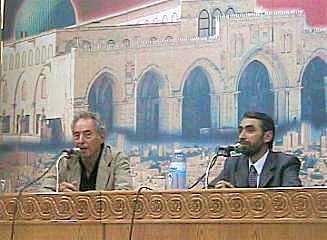 We drive to the Grand Mufti's foundation, Abu Nour.
After a wait in an anteroom, the women of our group are given
gowns with hoods.
We then enter a large hall, where about 200 young people are already seated.
The women sit in the back.
There is a stage in front with a podium.
Sam Keen, of our group, is already there fretting about technical problems.
He will give a talk here today, but his CD of powerpoint slides is
not working, and his talk relies very much on visuals.
We drive to the Grand Mufti's foundation, Abu Nour.
After a wait in an anteroom, the women of our group are given
gowns with hoods.
We then enter a large hall, where about 200 young people are already seated.
The women sit in the back.
There is a stage in front with a podium.
Sam Keen, of our group, is already there fretting about technical problems.
He will give a talk here today, but his CD of powerpoint slides is
not working, and his talk relies very much on visuals.
After an introduction from Bashar, Sam gives his talk with Bashar translating.
Sam discusses his book, "Faces of the Enemy".
The book is about propaganda from World War II and the Cold War, and how
we seek to dehumanize the enemy.
He is clearly discomfited by the poor visuals; the slides were hurriedly
scanned from his book and are virtually worthless.
Nonetheless, the talk is well received.
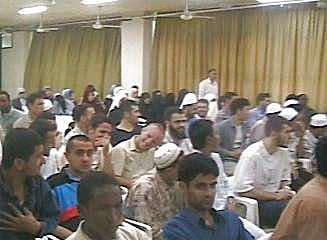 In the afternoon, we drive to Maalula.
This town is in the midst of an extraordinary landscape of volcanic
plugs and ridges.
Our hotel is a modern building on top of a crag overlooking the town.
Maalula is roughly 1/3 Eastern Orthodox, 1/3 Roman Catholic, and 1/3
Muslim. The churches and mosques seem evenly intermingled.
Everyone here speaks Aramaic.
In the evening, we see that about half of the houses have neon crosses
displayed. There are also neon and Christmas-tree-light crosses on
the hills overlooking us.
In the afternoon, we drive to Maalula.
This town is in the midst of an extraordinary landscape of volcanic
plugs and ridges.
Our hotel is a modern building on top of a crag overlooking the town.
Maalula is roughly 1/3 Eastern Orthodox, 1/3 Roman Catholic, and 1/3
Muslim. The churches and mosques seem evenly intermingled.
Everyone here speaks Aramaic.
In the evening, we see that about half of the houses have neon crosses
displayed. There are also neon and Christmas-tree-light crosses on
the hills overlooking us.
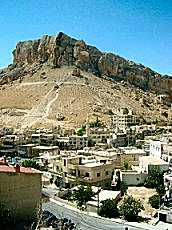 From our hotel we look down on the Greek Orthodox St. Tekla convent.
Next to our hotel is the Church of St. Sergius and St. Bachus.
This church is said to be the longest-serving to a single denomination
in the world. The altar dates to 313-325 A.D.
From our hotel we look down on the Greek Orthodox St. Tekla convent.
Next to our hotel is the Church of St. Sergius and St. Bachus.
This church is said to be the longest-serving to a single denomination
in the world. The altar dates to 313-325 A.D.
We walk downhill to St. Tekla, through a narrow gorge. We stop at a pharmacy and discover that we can buy Cipro for about 1/10th of the U.S. price. We talk with the pharmacist, who is Christian. In conversation he calls Bush a terrorist.
The convent is beautifully maintained; the Christian shrines around here are well-funded by the government.
 From here we drive to the Convent of Our Lady of Seydnaya.
This is said to be the second most-important Christian pilgrimage site
in the Middle East, after Jerusalem.
From here we drive to the Convent of Our Lady of Seydnaya.
This is said to be the second most-important Christian pilgrimage site
in the Middle East, after Jerusalem.
We continue from here back to Damascus, stopping in the suburbs at the church built on the supposed site of St. Paul's conversion. It's an ugly modern chapel. It is not open, but a friendly nun opens it up for us.
After Damascus, we reach the Syria-Jordan border. We again spend some time in the supervisor's office while functionaries handle our papers. There is a "lesser Haj" underway; it is an important season for pilgrimage to Mecca. So the lines are long and we are appreciative of the special treatment. We then drive past two huge portraits of Hafez and Bashar Assad, and ahead of us are two huge portraits of the late King Hussein and his son, the current King, Abdullah.
Throughout Syria we've noticed very few police, and when we do see them they are unarmed. There is little or no visible police presence in Syria, although we are later told that we were closely watched by the Secret Police the entire time. None of us noticed any surveillance.